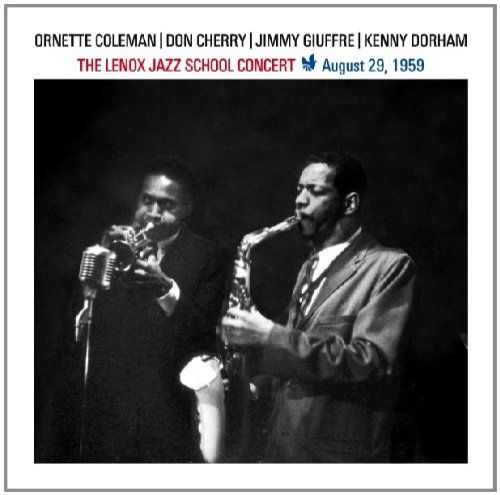Science Fiction Ornette Coleman Rar
Finally, on a pair of CDs in one collection are the rest of Ornette Coleman's Columbia recordings, all of them done before Skies of America. Science Fiction was a regular part of Columbia's jazz catalogue, and Broken Shadows was released on LP in 1982. On this double set, both of those records and three previously unreleased cuts from those sessions are together at last. Coleman assembled mostly alumni for his September 1971 sessions in the Columbia studios. The sizes of the ensembles range from septet to quartet to up to 11 players. His classic early bands are reunited here with trumpeter Don Cherry, saxophonist Dewey Redman, bassist Charlie Haden, and drummers Ed Blackwell and Billy Higgins. Augmenting these bands in places are pianist Cedar Walton, guitarist Jim Hall, trumpeter Bobby Bradford, vocalist Asha Puthi, and Science Fiction narrator, poet David Henderson. The swinging weirdness quotient is high on Science Fiction, especially on 'What Reason Could I Give,' 'Street Woman,' and 'Civilization Day.' The title track is an out, free-blowing fest that sounds hopelessly dated but is still cool, and on the tracks 'School Work,' 'Broken Shadows,' and 'Happy House,' listeners hear the first traces of the themes Coleman continues to employ. The inclusion of alternate takes offers the listener a cleaner view of the kind of harmonic theory Coleman was working against when he created harmolodics. Corel painter 12 trial download. Some of the oddities on these sessions are the seeming incongruities between Redman and Hall on 'Good Girl Blues,' with Webster Armstrong's singing with Walton's piano and Coleman just undermining the entire thing, trying to force another dimension out of the blues, or perhaps a new one into them. Elsewhere, on 'Rock the Clock,' listeners hear Coleman's first experiments with electricity, with a funky backbeat straining to maintain itself against his sawing violin, note-spattering trumpet; then there are Redman's bluesy post-bop chromatics (quoting Brubeck's 'Take Five' in his solo) moving atop a funky doubled-up backbeat and one scary amplified Charlie Haden bass. Kekkaishi episode guide. Science Fiction is a stellar collection of Ornette-ology assembled in one place. This is some of his very best material, archived and issued the way it should have been in the first place.

| Title/Composer | Performer | Time | Stream |
|---|---|---|---|
| 1 | 3:07 | SpotifyAmazon | |
| 2 | 6:05 | SpotifyAmazon | |
| 3 | 4:50 | SpotifyAmazon | |
| 4 | 5:02 | SpotifyAmazon | |
| 5 | 3:17 | SpotifyAmazon | |
| 6 | 3:56 | SpotifyAmazon | |
| 7 | 5:22 | Spotify | |
| 8 | 5:27 | SpotifyAmazon | |
| 9 | 5:36 | SpotifyAmazon | |
| 10 | 6:25 | SpotifyAmazon | |
| 11 | 5:46 | SpotifyAmazon | |
| 12 | 6:04 | SpotifyAmazon |
| Title/Composer | Performer | Time | Stream |
|---|---|---|---|
| 1 | 9:47 | Spotify | |
| 2 | 10:26 | Spotify | |
| 3 | 9:44 | ||
| 4 | 6:42 | Spotify | |
| 5 | 3:24 | Spotify | |
| 6 | 3:05 | Spotify | |
| 7 | 4:49 | Spotify |
Denardo Coleman
blue highlight denotes track pickOrnette Coleman Allmusic
Ornette Coleman's first album for Columbia followed a stint on Blue Note that found the altoist in something of a holding pattern. Science Fiction was his creative rebirth, a stunningly inventive and appropriately alien-sounding blast of manic energy. Coleman pulls out all the stops, working with a variety of different lineups and cramming the record full of fresh ideas and memorable themes. Bassist Charlie Haden and drummers Billy Higgins and/or Ed Blackwell are absolutely indispensable to the overall effect, playing with a frightening, whirlwind intensity throughout. The catchiest numbers -- including two songs with Indian vocalist Asha Puthli, which sound like pop hits from an alternate universe -- have spacy, long-toned melodies that are knocked out of orbit by the rhythm section's churning chaos, which often creates a totally different pulse. Two tracks reunite Coleman's classic quartet of Haden, Higgins, and Don Cherry; 'Street Woman' just wails, and 'Civilization Day' is a furious, mind-blowing up-tempo burner. 'Law Years' and 'The Jungle Is a Skyscraper' feature a quintet with Haden, Blackwell, tenorist Dewey Redman, and trumpeter Bobby Bradford; both have racing, stop-start themes, and 'Jungle's solos have some downright weird groaning effects. 'Rock the Clock' foreshadows Coleman's '70s preoccupations, with Redman playing the musette (an Arabic double-reed instrument) and Haden amplifying his bass through a wah-wah pedal to produce sheets of distorted growls. The title track is a free septet blowout overlaid with David Henderson's echoed poetry recitations, plus snippets of a crying baby; it could sound awkward today, but in context it's perfectly suited to the high-octane craziness all around it. Science Fiction is a meeting ground between Coleman's past and future; it combines the fire and edge of his Atlantic years with strong hints of the electrified, globally conscious experiments that were soon to come. And, it's overflowing with brilliance.
Ornette Coleman - Science Fiction review: Ornette meets God. Find album reviews, stream songs, credits and award information for Science Fiction - Ornette Coleman on AllMusic - 1971 - Ornette Coleman's first. Science Fiction, Something Else, Change of the Century, Dancing In.
| Title/Composer | Performer | Time |
|---|---|---|
| 1 | 3:06 | |
| 2 | 6:04 | |
| 3 | 4:50 | |
| 4 | 5:03 | |
| 5 | 3:16 | |
| 6 | 3:56 | |
| 7 | 5:22 | |
| 8 | 5:26 |